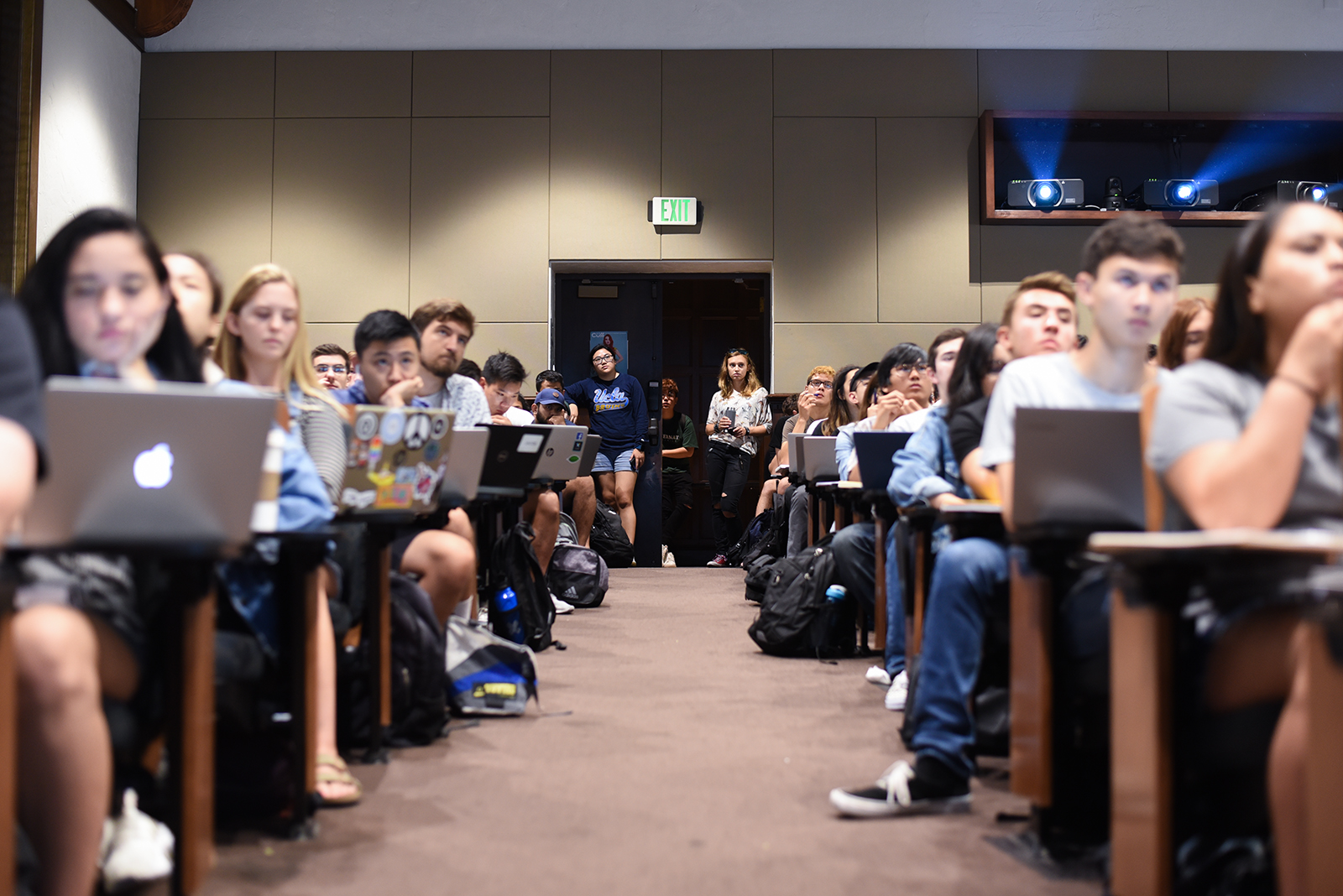UCLA program offers seminars developed, facilitated by undergraduate students

Under the Undergraduate Student Initiated Education program, third-year and fourth-year students can develop and teach a one-unit seminar with the help of faculty supervisors and a chosen advisor over the course of the year. (Joe Akira/Daily Bruin staff)
By Susan Monaghan
April 14, 2019 11:20 p.m.
Alejandra Cervantes is teaching fellow undergraduate students how to improve STEM teaching in higher education through her own credit-bearing class.
Cervantes, a fourth-year mathematics and computer science student, created a seminar called “Lifelong Kindergarten: Reimagining STEM Higher Education Pedagogy” through the Undergraduate Student Initiated Education program.
Under the USIE program, third- and fourth-year students can develop and teach a one-unit seminar with the help of faculty supervisors and a chosen advisor over the course of the year. Second- and third-year students can submit an application for selection during their spring quarter.
The USIE program was created in 2006, when several undergraduate students came to Judith L. Smith, the then-dean and vice provost for undergraduate education, with the idea for undergraduate-student-led courses at UCLA, according to USIE’s webpage.
More than 2,600 undergraduate students have taken USIE seminars as of spring 2018.
Cervantes created her seminar to address what she said she believes are failures of STEM teaching in higher education. The course is designed to make students consider the ways that STEM pedagogy can be improved at the university level.
“As a mathematics student, I had started seeing a lot of inefficiencies in how STEM classes are taught at UCLA and at the higher education level. I saw that there’s been a lot of progress at other levels, say K-12,” Cervantes said. “We’re still teaching things like science and technology and engineering and mathematics in a way that we did hundreds of years ago.”
Cervantes’ course addresses specific problems in STEM education and provides potential solutions to those problems.
“We’ve been discussing things like the amount of time it takes students to complete their degree. … We’ve been discussing fail rates, we’ve been discussing grading patterns, which tend to pit STEM students against each other,” Cervantes said. “Moving forward, we’re going to start looking for solutions to these problems, and how we can improve the outcomes of UCLA STEM.”
Cervantes is one of over 100 undergraduate students who have taught their own courses at UCLA through USIE.
Jacob Zazzeron, a fourth-year economics student and the USIE Faculty-Student Advisory Committee’s undergraduate co-chair, said he has seen firsthand the advantages of students taking on a more hands-on role in their education.
“I’ve seen (USIE) grow from something not really anybody knows about to a more known program,” Zazzeron said. “It’s been interesting to see how the faculty respond to my comments, as well as my co-chair’s comments, because we do offer different perspectives about what students actually need to learn in school, and some things that they don’t consider.”
The fall and winter quarter of the program are dedicated to honing teaching skills, such as methods of evaluation and ways of engaging students. In spring quarter, students teach their own classes.
Jennifer Cho, a fourth-year musicology and political science student, has taught the course “Music in Life of You: Listening Approaches” through USIE.
The USIE program allowed Cho to combine parts of her academic and personal interests to teach students to look at art through both a technical and emotional perspective, she said.
“Performance really wasn’t something that I felt encompassed what I felt toward music,” Cho said. “It was more than just playing, it was more than just interpreting the composer or the score; it was about what it really meant to me and what it meant for people, and how communities are shaped around it, and how music is used in various situations, what that really means.”
Cho said her course is designed to give her students a view of the many disparate branches of musicology, rather than an in-depth look at just one. Each week is dedicated to a topic of musicology, including “musicking,” the temporality of music and identity in music, she said.
“My original thought (was) that many people experience music, or have experiences in music, in a very unidirectional sense,” Cho said. “If you’re listening to music or you’re expressing yourself with music, you’re tending to look at the sounds … but you can also kind of create depths within music if you look at its social contexts, or its cultural contexts or its historical or … teleological (contexts).”
Cho said her experience with USIE led her to change her career goals. Despite having played piano and violin from an early age, Cho initially planned to pursue business and economics in college.
“I got to UCLA under business economics. … Honestly, it made me very nervous during that time, as a 17- or 18-year-old trying to choose a decision that almost feels like the rest of your life,” Cho said. “I would go to concerts and actually have to walk out in the middle, because I … knew I wasn’t doing what I needed to do.”
After teaching the subject through USIE, Cho eventually switched her major to musicology and is now considering pursuing a doctorate in musicology.

